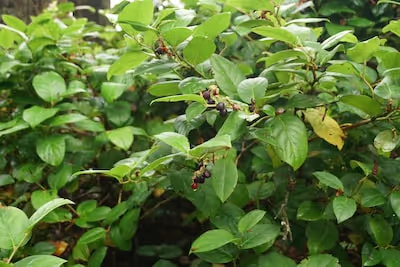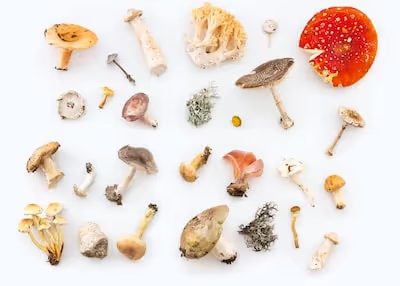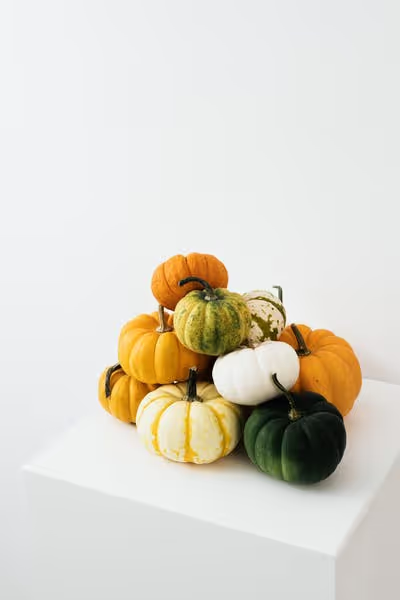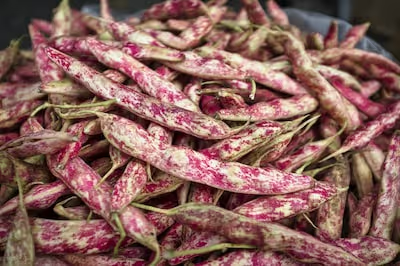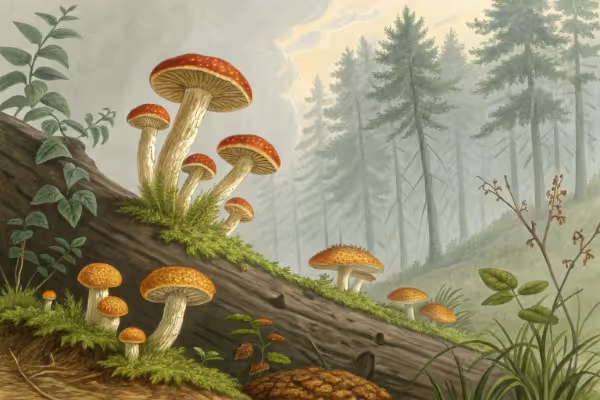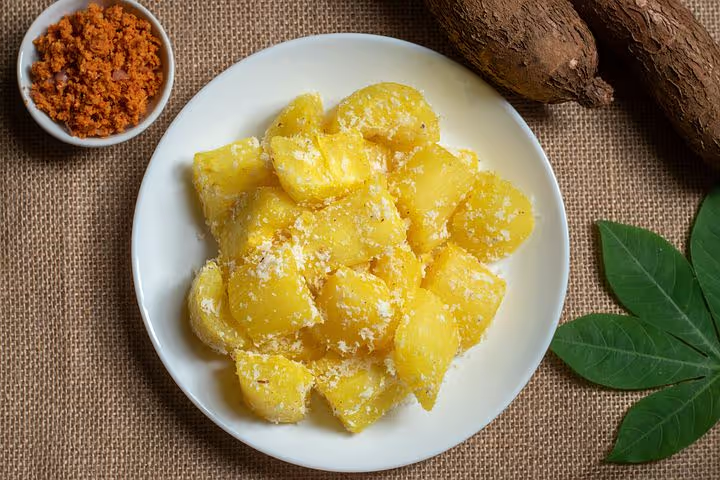Growing Bilberry: A Gardener’s Guide to Healthy Harvests
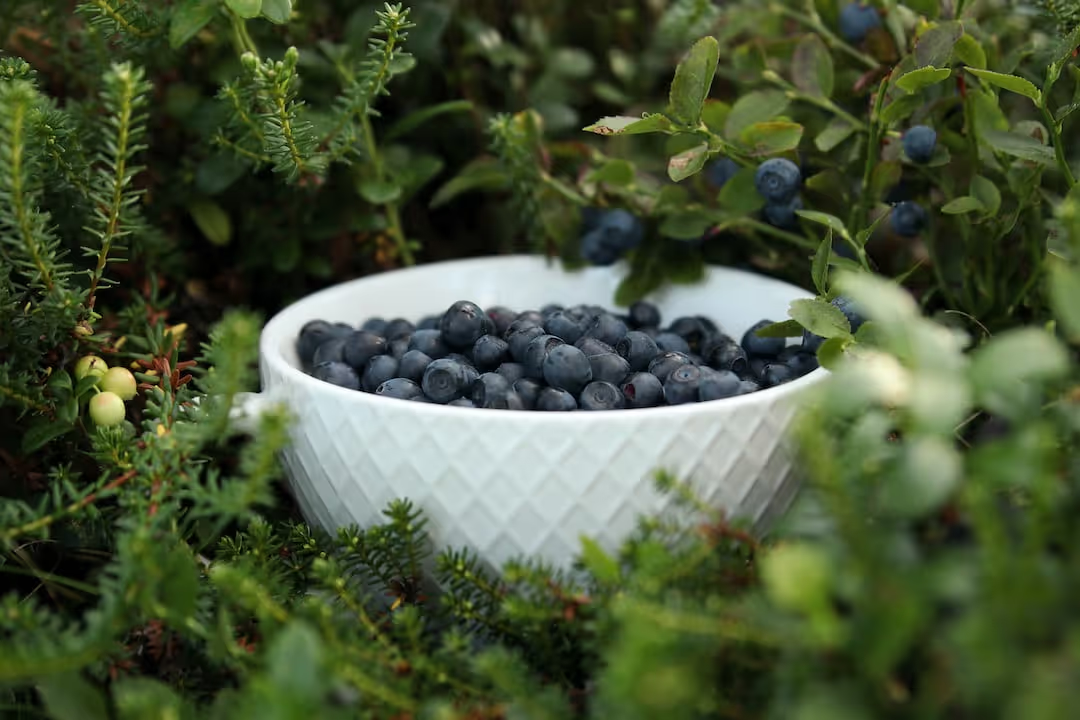
Growing Bilberry
Growing bilberry rewards gardeners with tart, flavorful berries and a shrub that thrives in acidic, well-drained soil. Choose partial shade and keep soil consistently moist—bilberries loathe dryness. Prune lightly each spring to promote healthy growth and abundant summer fruit; follow our guide and you'll master the subtle art of growing bilberry in your own backyard.
Cheatsheet: Cultivate Lush Bilberries at Home
🌱 Site & Soil
- Acidic soil (pH 4.0–5.5) required
- Light: Partial shade boosts fruiting; avoid deep shade
- Soil: Moist, well-drained, humus-rich
- Spacing: 3 ft (1 m) apart
🌧️ Water & Mulch
- Keep soil consistently moist
- Mulch with pine needles or bark to retain acidity
🌼 Planting Steps
- Soak roots 1 hour before planting
- Dig hole 2x rootball width, 16 in (40 cm) deep
- Mix peat moss into backfill
- Set plant at same soil level as pot
- Water deeply and mulch 2 in (5 cm) thick
🌿 Care & Feeding
- Fertilize in spring with ericaceous feed
- Prune dead wood in late winter
- Net bushes to block birds at fruit set
🍇 Harvest
- Ripen July–August
- Pick when deep blue, taste sweet-tart
- Yields peak after 3–5 years
💪 Health & Self-Sufficiency
- Rich in anthocyanins: 3x more than blueberries
- Boosts vision & immunity
- Freeze or dry for year-round use
🛠️ Tools and products you'll need
- Acidic potting mix/peat moss
- pH soil test kit
- Hand trowel, pruners
- Watering can
- Mulch (pine bark/needles)
- Bird netting
🌍 Quick Facts
- Bilberries tolerate -40°F (-40°C)
- Fruit contains 4x vitamin C of blueberries
- One bush serves a family’s annual needs
-
Growing Bilberry: the plant I’ll always make room for
I grow Vaccinium myrtillus for its ink-dark fruit and woodland grace. It behaves like a shy understory shrub with attitude, thriving where soil runs sour and summers stay cool.
Growing Bilberry rewards patience, steady moisture, and a peat-free ericaceous medium that breathes. The payoff tastes like mountain air and looks like midnight.
Site and soil chemistry
Bilberry roots crave acidic soil, ideally pH 4.0 to 5.2, with high organic matter and sharp drainage. I tuck plants on a north or east aspect for dappled light and cool roots.
Test your pH first. If soil reads above 5.5, I go to containers or raised beds filled with ericaceous compost plus fine pine bark and perlite at 3:2:1.
Water with rainwater if your tap runs alkaline. Hard water pushes pH up and starves plants of iron and manganese.
Climate and hardiness
Expect the best performance in cool maritime or upland climates. Mine handle winter lows to about 30 below F, near minus 34 C, yet flowers toast under sharp late frosts.
Bilberry thrives in USDA zones 3 to 6 and similar EU climates. Heat above 85 F, 29 C, tires plants unless shaded and well mulched.
Planting, spacing, and containers
I plant in early spring once ground is workable. Space 18 to 24 in, 45 to 60 cm, and let rhizomes knit a small colony over a few years.
For pots, use at least 5 gallons, 20 liters, with sidewall aeration. I line the surface with pine needles or shredded conifer bark to lock in acidity and moisture.
Water and feeding
Keep moisture even, never sodden. Shallow roots hate drought and standing water in equal measure.
Feed lightly in spring with a low-nitrogen, ammonium-based ericaceous fertilizer. Avoid phosphates and manure, which burn or raise pH.
Mulch that makes a difference
Pine needles, spruce sawdust, and fine bark cool the crown and buffer pH. I refresh to a 2 to 3 in, 5 to 8 cm, layer each spring.
Skip lime, mushroom compost, and ashes. Those drift pH upward and stall growth.
Pruning and renewal
Bilberry fruits on two to three-year wood. I thin in late winter, removing dead twigs and a quarter of the oldest stems to ground level.
Keep it light and regular. Big chops trigger sulking.
Pollination, bloom, and fruit set
Greenish pink bells open in spring and rely on bumblebees for buzz pollination. I plant a patch of three or more to improve set and spread bloom time.
Cold snaps during bloom can wipe a crop. Floating row cover on frosty nights buys you a harvest.
“Bilberry prefers acid soils and light shade in woodland or heath habitats.” Royal Horticultural Society, Plant Profile for Vaccinium myrtillus.
Yields and realistic expectations
A mature plant in good conditions gives roughly 0.3 to 1 pound, 140 to 450 g, per season. Wild-like flavor beats supermarket sweetness, and that’s the trade I make every time.
Commercial yields lag far behind highbush blueberries. The plant pays in character and nutrition rather than bulk.
Propagation that actually works
Semi-ripe cuttings in midsummer root best for me at 2 to 3 in, 5 to 8 cm, with bottom heat around 70 F, 21 C. I use a 50:50 mix of fine bark and perlite and keep humidity high.
Division of rhizomes in early spring also takes, provided you tag a shoot with each piece. Seed needs 8 to 12 weeks of cold stratification at 34 to 41 F, 1 to 5 C, and grows slowly.
Inoculating media with ericoid mycorrhiza speeds establishment. I borrow a scoop of soil from a thriving Vaccinium patch to do it the old way.
Pests, diseases, and my fixes
Birds find bilberries faster than I do. I use fine netting at blush stage and anchor it tight to keep songbirds safe and fruit mine.
Vine weevil larvae chew container roots. Sticky traps, beneficial nematodes, and gritty bark-heavy mixes keep numbers low.
Botrytis shows up in still, wet weather. I prune for airflow and water early so foliage dries before dusk.
Harvest and handling
Berries turn blue-black with a dull bloom, then soften and bleed purple when ripe. I pick by hand every three days to dodge drop.
Chill fast to 34 to 38 F, 1 to 3 C, and use within 3 to 5 days. Freeze on trays for winter pies and sauces.
“Bilberries carry higher anthocyanin concentrations than many cultivated blueberries, often exceeding 300 mg per 100 g fresh weight.” Journal of Agricultural and Food Chemistry, peer‑reviewed studies on Vaccinium myrtillus.
Flavor notes and kitchen perks
The taste splits the difference between wild blueberry and blackcurrant. I cook them low and slow with lemon zest and a whisper of sugar because the fruit already sings.
Buy smart: plants, media, and kit I trust
- Plants: Choose container-grown Vaccinium myrtillus with tight internodes and fresh green tips. Ask for stock raised in acidic media and confirmed disease-free.
- Soil and amendments: Peat-free ericaceous compost, fine pine bark, coarse perlite, elemental sulfur, and chelated iron for rescue feeds.
- Fertilizer: Acid-forming, slow-release blends with low P, for example N-P-K around 4-3-4, plus micronutrients for calcifuge shrubs.
- Water gear: Rain barrel and a simple inline filter. A moisture meter saves guesswork in hot spells.
- pH tools: A reliable soil pH meter or dye kit for quarterly checks. Keep a log so corrections stay gentle.
- Protection: Soft mesh netting, spring hoops, and frost cloth rated to 28 F, minus 2 C, for bloom nights.
Cultivar notes and sourcing
Named bilberry cultivars exist in limited numbers compared with blueberries. I buy regionally selected clones from specialist nurseries in Scandinavia and the UK for better fruit set and cold tolerance.
Seed-grown plants vary a lot. Clonal stock keeps berry size, timing, and habit consistent.
Top alternatives and companions
- Blueberry, Vaccinium corymbosum: Bigger crops, wider nursery choice, needs similar acidic conditions, full sun to light shade.
- Huckleberry, Vaccinium membranaceum and relatives: Wild flavor, thrives in cool mountain air, slow to establish at lowland sites.
- Lingonberry, Vaccinium vitis-idaea: Groundcover habit, two crops per season, tolerates brighter sites if moisture holds.
- Cranberry, Vaccinium macrocarpon: Loves acid and water, but needs a sandier bed and winter chill, excellent for low boggy spots.
Container recipe that never lets me down
- 3 parts peat-free ericaceous compost.
- 2 parts fine pine bark for structure and lignin.
- 1 part coarse perlite for drainage, with a pinch of elemental sulfur to hold pH at 4.5 to 5.0.
Mix dry, pre-wet with rainwater to field capacity, then pot and mulch. Feed lightly after new growth hardens.
Season calendar
- Late winter: pH check, light renewal pruning, mulch top-up.
- Early spring: Planting, sulfur corrections, frost cloth staged.
- Late spring: Bloom and bee time, steady moisture, zero overhead watering.
- Summer: Netting, harvest every 2 to 3 days, tip pruning only if needed.
- Autumn: Soil test, sulfur if pH creeps, tool cleaning, notes for next year.
Common problems and quick fixes
- Yellow leaves with green veins: Likely iron chlorosis from high pH. Flush with rainwater, apply chelated iron, add sulfur to media surface.
- Leaf scorch in midsummer: Heat stress. Add shade cloth to 30 percent, deepen mulch, water in the morning only.
- Poor fruit set: Frosted bloom or low pollinator traffic. Row cover on cold nights and plant nectar-rich companions like thyme and borage close by.
Numbers I watch
- Soil pH: 4.0 to 5.2 for steady growth.
- Moisture: Keep media near field capacity, never waterlog; about 1 inch, 25 mm, per week including rain.
- Mulch depth: 2 to 3 in, 5 to 8 cm, renewed annually.
- Frost threshold at bloom: Protect below 30 F, minus 1 C.
Why I still pick bilberry over easy fruit
It asks for a very particular table setting and then rewards with flavors that taste like old forests after rain. Anthony Bourdain would have approved of the honesty and stain-your-hands proof of work.
As Terence McKenna might say, the plant invites a slower rhythm and a closer look at the living soil under our boots. Growing Bilberry teaches that lesson better than any lecture ever could.
References I trust
- Royal Horticultural Society, Vaccinium myrtillus plant profile and cultivation notes.
- Journal of Agricultural and Food Chemistry, analyses of anthocyanins in Vaccinium myrtillus fruit.
- Kew, Plants of the World Online, habitat and distribution data for Vaccinium myrtillus.
- USDA and extension blueberry guidelines for acidic soil management, adapted to bilberry scale and shade tolerance.
Frequently Asked Questions About Growing Bilberry
What soil type best suits bilberry plants?
Bilberries flourish in acidic soil (pH 4.0-5.5) enriched with organic matter. Mix peat moss or composted pine needles into well-draining loamy soil to create conditions necessary for optimal growth.
Will bilberries thrive in containers or pots?
Yes, container gardening works well for bilberries. Choose a pot at least 12-16 inches (30-40 cm) wide and deep to accommodate their shallow root systems and regularly check that the soil remains consistently moist yet drains freely.
How frequently should bilberry plants be watered?
Though bilberries require moisture, avoid overly wet conditions. Provide irrigation once or twice weekly, maintaining evenly moist but never soggy soil. Check soil moisture regularly and increase watering frequency in dry or exceptionally warm periods.
Can bilberries tolerate direct sunlight?
Bilberries thrive in partial shade or filtered sunlight. Although they grow adequately in sunnier spots in cooler climates, prolonged exposure to direct sunlight may stress plants, especially in areas with hotter summer temperatures above 85°F (29°C).
Are bilberry plants frost-hardy?
Absolutely, bilberries are naturally cold-resistant plants. Mature bushes endure temperatures as low as -25°F (-32°C). However, protect younger plants or freshly transplanted bushes by applying mulch for added insulation during winter.
When and how should you prune bilberry bushes?
Prune bilberry bushes annually in late winter or early spring, before new growth emerges. Remove weak, damaged, or dead branches first, then trim older stems to make room for newer, productive growth, maintaining balanced air circulation and sunlight exposure.
What pests and diseases commonly affect bilberries?
Bilberries occasionally encounter pests like aphids, spider mites, and vine weevils. Diseases such as powdery mildew or root rot might also arise, usually resulting from poor drainage or high humidity. Regular inspection, proper spacing for airflow, appropriate watering techniques, and preventative organic sprays effectively address most issues.
When do bilberries become ready for harvest?
Expect bilberries to ripen between late July and September, depending on your specific climate conditions. Ripe fruits appear deep blue to nearly black and detach easily from stems. Harvest berries gently but regularly to encourage further production of fruits.
Growing bilberry demands patience and a taste for the wild edge of gardening. These berries crave acidic soil, consistent moisture, and a gentle hand—think more forest floor than factory farm. If you can give them that, you’ll get fruit that makes supermarket berries seem bland. Mulch deep, prune smart, and let time do its work. If you’re already growing other woodland crops or have tried your hand at growing blackcurrant, bilberries will feel like old friends. In the end, the real reward is in the harvest: small, intense, and unforgettable. Keep it simple, keep it wild, and growing bilberry will pay you back every summer.
The Prepper’s Guide to Growing Bilberry for Resilience
Long-term Food Security Benefits
- Bilberries produce nutrient-dense fruit rich in vitamins C and E, antioxidants, and dietary fiber, supporting immune function and energy.
- Perennial shrubs produce fruit annually for up to 20 years or longer if cared for correctly.
- Bilberry bushes withstand temperatures down to -29°C (-20°F), ideal for colder climates.
Essential Preparedness Tools & Supplies
- Burlap Covers: Durable, reusable material insulates bushes from frost, extending survival through harsher winters.
- Soil pH Kit: Regularly test and maintain acidity between 4.5 and 5.5 for productive harvests.
- Rainwater Collection Barrels: Clean rainwater maintains soil acidity, reduces reliance on municipal water supplies.
Preserving Bilberries for Extended Storage
- Dry freshly picked, undamaged berries fully at 57°C (135°F) for 8–10 hours before storage in sealed jars for up to one year.
- Canning berries whole in sterilized jars extends their nutritional lifespan for 2–3 years; store jars in cool, dark places.
- Freezing berries quickly after harvest preserves nutrients effectively for up to 12 months.
Multipurpose Medicinal Uses
- Dried berry tea supports eye health and circulation; steep two teaspoons dry berries in hot water for 10 minutes.
- Processed bilberry extracts naturally reduce inflammation and manage blood sugar levels.
- Berry-infused tinctures last up to five years; useful addition to emergency medicinal kits.
Strategic Bilberry Bush Planting Practices
- Plant bushes along edges or under taller tree canopies, providing natural shelter and wind protection.
- Employ raised beds for improved soil drainage and minimized disease risks.
- Space bushes approximately 0.6–0.9 meters (2–3 feet) apart to maximize yields and simplify maintenance.
Find out which plants will thrive in your garden!
Answer a few fun questions and get custom plant recommendations perfect for your space. Let’s grow something amazing together!

start your season
